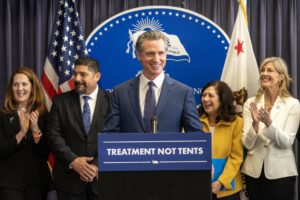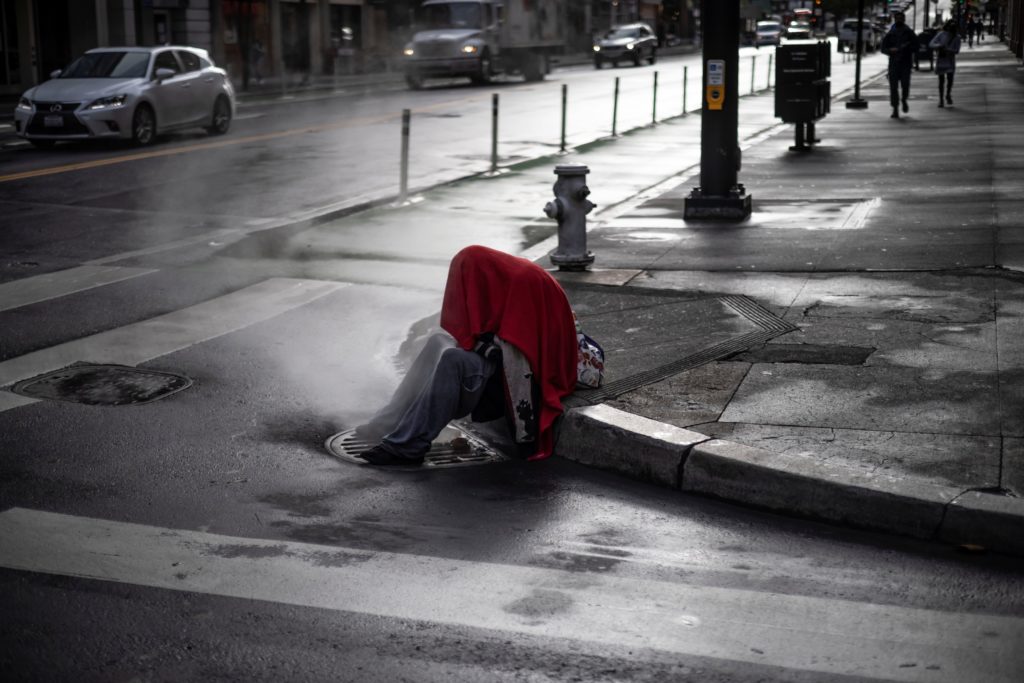Last month, California voters narrowly approved Proposition 1, a measure that expands the state’s mental health and substance abuse treatment infrastructure by authorizing $6.4 billion in bond money toward building treatment facilities and housing for the homeless.
While supporters have hailed the measure as an important step in addressing California’s homelessness crisis, not everyone is convinced.
Meghan Schrader is an instructor and mentor at the E4Texas (Texas Center for Disability Studies) program at the University of Texas at Austin and is on the board of the Euthanasia Prevention Coalition USA. Her experience growing up with a learning disorder inspired her to serve on the governing board of the Boston Autistic Self Advocacy Network in 2015 and to volunteer as an education advocate for disabled students in foster care.
In an interview with Angelus, Schrader shared her concerns about Proposition 1’s potential effects on the mentally disabled and her thoughts on how Catholics can help advocate for their protection.
There is a lot going on in California at the moment, much of which is concerning to disabled populations. What are your thoughts, in particular, about Proposition 1?
Proposition 1 was sold to the public as a way to increase housing and treatment for people with severe mental illnesses. In reality, California has been given an inappropriately high level of latitude to institutionalize people against their will.
Involuntary treatment was already legal for hard cases, but now the process of placing people in institutions has been streamlined and ramped up. This will subject people with psychiatric disabilities to various forms of abuse, both systemically and interpersonally, and will intersect with other forms of oppression, such as racism and poverty.
The motivation behind this program is not necessarily humane, even if it’s sold as such. We certainly need better community options for homeless people experiencing mental illness, but Gov. Gavin Newsom proposed this law to make homeless people disappear from sight.
He’s not alone in his support for what disability advocates call “Modern Ugly Laws;” New York politician Andrew Yang suggested that homeless New Yorkers with psychiatric disorders should be institutionalized so they do not harm tourism or property values. President Trump suggested institutionalizing mentally ill people to stop gun violence. These sorts of policies stigmatize and undermine civic equality for people with psychiatric disorders.
How do you think this would have unfolded differently if they had listened to the voices of the disabled? What are better ways of addressing the very real problems here?
Institutionalization has a strong historical link to the eugenics movement, which still influences contemporary public policy. Proposition 1 fits into our country’s deep history of killing, sterilizing, and confining persons with disabilities, and I think that if people listened to the disabled community’s knowledge about this history, efforts like Proposition 1 would be less popular.
Complicating the issue is that deinstitutionalization efforts have sometimes been abused as a way to save money instead of a way to redirect or improve community treatment. Andrew Cuomo closed a lot of New York’s mental institutions but never properly funded or oversaw the community alternatives.
When President Kennedy signed the Community Mental Health Act in 1963, he promised federal funding for the alternatives that were never effectively provided or overseen. There’s a pattern of the powers that be spending the money they save with deinstitutionalization on things other than community support, so that no matter what system is being used, people with severe mental illnesses are ignored and abused.
Unfortunately, this pattern of setting disabled people’s interests aside is not unique to mental health care; it affects all systems that serve people with disabilities.

Even people interested in social justice for the able-bodied members of other disenfranchised groups have been resistant to redressing these dynamics. That’s what “systemic ableism” is: a group of systems intersecting in a way that favors able-bodied people’s preferences with grave consequences for people with disabilities. If disability justice were more culturally visible, things like Proposition 1 would be less likely.
I can personally speak to the issue of inadequate mental health support. I have experienced episodes of severe psychiatric disability since my teens. High-quality treatment facilities can be critically important places of respite and care, while other psychiatric facilities can be microcosms of hell; other facilities being a mixture of both.
The risk of hospitalization is one of the reasons why community treatment is so necessary, but the process of accessing community support is so dysfunctional that people who need it never participate. Between 2019 and 2021, I tried to qualify for Austin, Texas’ assertive community treatment program, which provides robust, structured support for people with severe mental illnesses who are living on their own. I called 10 different people who were listed as being associated with the program. None of them even knew what the program was, so I eventually gave up.
I have also tried to qualify for services for people with my neurological disabilities, which would significantly reduce the environmental stressors that exacerbate symptoms of my bipolar disorder. At the end of a complicated process, I was disqualified because my IQ was above the state cutoff for those services.
These wasteful, bureaucratic dynamics exist no matter what state disabled people live in. We need to fix the dysfunction that exists for accessing voluntary treatment and support.
Some in California are trying to expand physician-assisted killing to include those who are not dying. Disabled populations are mentioned in particular as eligible under the new law. That law is bad enough on its own, but what would it mean to have these two laws together?
Forced institutionalization will amplify the ugly impact of assisted suicide on the lives of people with disabilities. Making suicide a “treatment” for people with disabilities is abusive enough. But, some people with “grievous and irremediable” medical conditions who also have severe mental illnesses will absolutely choose to kill themselves rather than be placed in an institution.
Disabled people living in institutions will choose to kill themselves just to get out of there, and staff will encourage them to do it. This is already in play in Canada, which legalized forced transfers of disabled patients to institutions far away from their families at the same time that it legalized MAiD (Medical Assistance in Dying) for disabled people. So, California is setting the stage to follow in Canada’s violent, ableist footsteps.
Increasing forced institutionalization while expanding assisted suicide to people with disabilities furthers able-bodied supremacy. This combination of laws allows disabled people to have the unfettered “choice” of suicide, but not community support. Disabled people will be eliminated, reflecting our societal indifference to — and often hatred of — disabled people.

What are some ways that individual Catholics and Catholic institutions can resist the cultural forces pushing in these terrible directions?
Catholics must recognize that Proposition 1 and laws facilitating assisted suicide are the final blow after a lifetime of abuse and oppression. Early Christians and Jews took the lead in opposing the pagan practice of infanticide for disabled babies. Today’s Catholics must nurture the longstanding overlap between Christian ethics and disability justice, and they should collaborate closely with the disability justice movement’s broader goals. Catholics must not help the disabled community fight assisted suicide and then vote for things like Proposition 1 — they should defeat both.
They must keep James 2:3 in mind and welcome people with severe mental illnesses into their communities, even if that process feels uncomfortable. And they should consider Christ’s statement in John 10:9-11 that he came to give people “life more abundantly.” Providing robust support for disabled people is a way of making that a reality.
Lastly, they should think about fighting institutionalization, assisted suicide, and ableist bias in terms of Isaiah 61:1: “He has chosen me and sent me to bring good news to the poor, to heal the broken-hearted, to announce release to captives and freedom to those in prison.”

